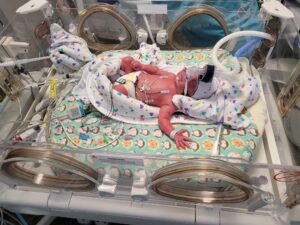
Skin like a baby – a saying we all hear. We expect our sweet babies to have smooth and flawless skin. For some babies, the smooth skin does not last long. If your baby’s smooth newborn skin becomes red, dry, bumpy, and itchy, eczema is often the culprit. Healing baby eczema can feel overwhelming, but it is possible!
What is Eczema?
Eczema is the term for chronic skin conditions which cause redness, dry skin patches, bumpiness, and itchiness as the result of inflammation. This inflammation is often due to allergies and sensitivities.
Can You Prevent Eczema?
New research suggests that pregnant people who take probiotics during the last trimester might reduce their infant’s risk of eczema by 29%. However, if you are reading this article, chances are you are beyond trying prenatal probiotics.
It is also important to note that there seems to be a strong hereditary component with eczema and other allergic type conditions.
However, breastfeeding parents who take probiotics might reduce the risk of eczema by 40%.
Infants and young children who are given probiotics directly may also have a reduced risk of eczema by 20%. (“Breast milk for baby eczema – aveeno® baby is here to help”)
Do Probiotics Really Help?
Why? Probiotics are beneficial bacteria. Good bacteria are essential for gut and immune system health. Having a good balance of healthy bacteria helps our bodies to function at their best. While probiotics cannot guarantee your child will be eczema free, it can reduce their risk.
Probiotics don’t typically have concerning side effects so it a safe option for many to help reduce an infant’s chance of eczema. If your little one has eczema, probiotics might still help control breakouts. You can reach out to their pediatrician for more information and to find out if probiotics are a good option for your child.
Prevention is great, but it does not always work. Some infants have overly sensitive systems and skin. They may simply be prone to eczema no matter what preventative steps were taken during pregnancy. This is especially true if your family has a history of eczema, asthma, hay fever, and food allergies.
Fortunately for our most sensitive little ones, many options exist to treat and reduce eczema symptoms and flares.
Here are 6 tips for reducing and healing baby eczema flares:
#1 – Steer Clear of Dyes, Fragrances and Chemicals for Healing Baby Eczema
If your little one has eczema, staying clear of dyes, fragrances and chemicals can help reduce their flares. Fragrances, even natural scents, can be an allergen trigger for many with eczema.
Commercial dyes in detergents, shampoos, and soaps often contain many chemicals. Even ones marketed for babies. These chemicals can be very harsh to any skin, but especially those with eczema. Use dye-free products whenever possible. While eczema is on the skin, things we ingest can still cause flares. Avoiding dyes in food can also help some infants avoid flares. This will vary infant to infant. If your doctor prescribes any medications or vitamins for your baby, you can ask the pharmacist to use dye free versions when possible.
When you can, use natural soaps, detergents, and oils. Commercial lotions, even those labeled for baby, often contain a lot of chemicals. Some people with eczema do well with natural oils like coconut and even olive oil. Some also find almond oil helpful, but do be careful as that is an allergen for some.
#2 – Test for Food Allergies and Avoid Triggers
Eczema is topical, but everything we ingest can impact our entire body. Many infants with eczema also have food allergies or sensitives. Some parents ask their doctors to order a food allergy test and others utilize elimination diets to find the culprit.
It is important to note that some providers cannot do testing prior to one-years-old. This is because the testing is not exactly accurate for young ones. If this is the case, elimination and rechallenge diets are best.
Around 2-8% of infants are allergic to cow’s milk. Among exclusively breastfed, around 0.5% are allergic to cow’s milk. It is not uncommon for any to assume fussing breastfed infants are sensitive to something in mama’s diet, but often fussing and gas is normal newborn adjustment.
That said, if your baby is spitting up, has chronic diaper rash, cries in pain, and has eczema it is worth looking into food triggers.
Soy and wheat are also common sensitivities and allergies in infants. Any food can be an allergen though, so it is a good idea to talk these possibilities over with your pediatrician, allergist or other healthcare provider.
If you are breastfeeding, trying an elimination diet and watching for symptoms in your infant is usually the recommended step when allergy concerns arise. In more severe cases where it is hard to pinpoint, allergy testing might be ordered.
If your baby is formula fed, your doctor might recommend trying a different formula. They might recommend dairy free formula, a formula with broken down soy and dairy proteins, or even an elemental formula.
#3 – Stick with Cotton Fabrics for Healing Baby Eczema
Synthetic fabrics and even animal-based fibers can trigger a skin reaction in sensitive individuals. 100% cotton clothing, blankets and even diapers in overly sensitive babies, is often recommended by dermatologists.
Be sure to wash all new items in a dye-free, fragrance free and low chemical detergent before having any fabric come into contact with your baby.
Most fabrics are processed with a load of chemicals. This makes washing necessary. It is a good idea to stick with 100% cotton clothing for yourself too, when possible. While animal fibers can be a great natural option for many, it can be triggering for sensitive people.
#4 – Eat a Whole Foods Diet
Unfortunately, many processed foods contain a lot of preservatives, dyes and even chemicals. These things can cause inflammation in sensitive individuals. Avoid giving these items to your baby once they begin solids, and if you are breastfeeding consider avoiding them yourself.
The nutrition in a whole foods diet also helps our bodies to function at their best. It helps facilitate good gut and immune system health. Both of which can help with autoimmune responses, such as eczema.
In our fast-paced world, avoiding all processed foods can be difficult. If you are breastfeeding this is not something to stress over. Even if you consume processed food on a regular basis, your breast milk is still an optimal whole food for your little one!
#5 – Moisturize, Moisturize, Moisturize – Keep Their Skin Moisturized!
Keeping the skin moisturized can help heal breakouts, reduce itching, and even prevent breakouts. In fact, some research shows daily moisturizing as early as birth can reduce the risk and severity of eczema.
One effortless way to remember to moisturize often is to apply a moisturizer with each diaper change. Some doctors use this advice to help parents remember. You can check with your baby’s doctor if this is a good option for you.
Avoid creams and lotions that have fragrances, dyes, and a lot of chemicals.
There are many creams and lotions marketed for eczema. The products do work for some minor eczema. However, some brands contain lots of ingredients which can increase the risk of a reaction. Pure aloe vera and some natural oils work well for many with overly sensitive skin.
If breakouts and flares are not clearing with regular moisturizing, sometimes a prescription medicated cream, ointment or gel is necessary. You can discuss this with a pediatric dermatologist to decide if these are necessary.
In the event your baby needs prescription care, many dermatologists find ointment-based ones work best. There are typically less ingredients which could cause irritation.
#6 – Avoid Overheating and Unprotected Sun Exposure for Healing Baby Eczema
Sweat can cause eczema flairs in some infants. Many infants have adorably chubby legs, arms and bellies which can trap sweat in crevices causing the skin to become irritated. Keeping babies in shade and limiting their heat exposure can help keep flares under control.
A few extremely sensitive infants can have photosensitive eczema which means sunlight can cause a flare. If baby seems to flare after being in the sun, try to limit sun exposure. Hats, sunscreen, shade, etc. are great to reduce sun exposure.
Dealing with infant eczema can be frustrating and challenging. Figuring out different triggers and what works for healing can be a process. Fortunately, most infants become less reactive after their triggers are found and avoided. If you are still expecting, there might even be a possibility you can avoid the troubles that come with infant eczema.



